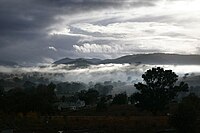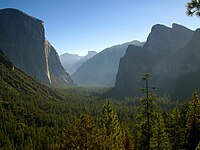Morning: Difference between revisions
No edit summary Tags: Visual edit Mobile edit Mobile web edit |
Undid revision 933406937 by 2600:387:4:803:0:0:0:77 (talk) Falsification. |
||
| Line 2: | Line 2: | ||
{{Distinguish|Mourning}} |
{{Distinguish|Mourning}} |
||
{{Redirect|Early morning|the play|Early Morning|other uses|Morning (disambiguation)}} |
{{Redirect|Early morning|the play|Early Morning|other uses|Morning (disambiguation)}} |
||
'''Morning''' is the period of time from [[sunrise]] to |
'''Morning''' is the period of time from [[sunrise]] to noon.<ref>[http://oxforddictionaries.com/definition/english/morning?view=uk Oxford Dictionary] </ref> There are no exact times for when morning begins (also true for [[evening]] and [[night]]) because it can vary according to one's lifestyle and the hours of [[daylight]] at each time of year.<ref>[http://www.learnersdictionary.com/qa/parts-of-the-day-early-morning-late-morning-etc Learner's Dictionary]</ref> However, morning strictly ends at noon, which is when [[afternoon]] starts. Morning can be defined as starting from midnight to noon, or from sunrise (which varies throughout the year)<ref>[https://www.timeanddate.com/sun/uk/london timeanddate.com]</ref> to noon, or from when one wakes up to noon.<ref>Online dictionary definitions of "morning". |
||
*[http://oxforddictionaries.com/definition/english/morning?view=uk Oxford Dictionary] |
*[http://oxforddictionaries.com/definition/english/morning?view=uk Oxford Dictionary] |
||
Revision as of 19:14, 31 December 2019

Morning is the period of time from sunrise to noon.[1] There are no exact times for when morning begins (also true for evening and night) because it can vary according to one's lifestyle and the hours of daylight at each time of year.[2] However, morning strictly ends at noon, which is when afternoon starts. Morning can be defined as starting from midnight to noon, or from sunrise (which varies throughout the year)[3] to noon, or from when one wakes up to noon.[4]
Morning precedes afternoon, evening, and night in the sequence of a day. Originally, the term referred to sunrise.[5]
Etymology
The Modern English words "morning" and "tomorrow" began in Middle English as morwening, developing into morwen, then morwe, and eventually morrow. English, unlike some other languages, has separate terms for "morning" and "tomorrow", despite their common root. Other languages, like German, may use a single word – Morgen – to signify both "morning" and "tomorrow".[6][7]
Significance for humans
Some languages that use the time of day in greeting have a special greeting for morning, such as the English good morning. The appropriate time to use such greetings, such as whether it may be used between midnight and dawn, depends on the culture's or speaker's concept of morning.[8] 'Good morning' is usually used from 5:00 a.m. to 12:00 p.m.
Many people greet someone with the shortened 'morning' rather than 'good morning'. It is usually used as a greeting, never a farewell, unlike 'good night' which is used as a farewell. To show respect or to be more informal in business communication, one can add the collocutor's last name after the salutation: Good morning, Mr. Smith.[9]
Morning typically encompasses the (mostly menial) prerequisites for full productivity and life in public, such as bathing, eating a meal such as breakfast, dressing, and so on. It may also include information activities, such as planning the day's schedule or reading a morning newspaper. The boundaries of such morning periods are by necessity idiosyncratic, but they are typically considered to have ended on reaching a state of full readiness for the day's productive activity.[citation needed] For some, the word morning may refer to the period immediately following waking up, irrespective of the current time of day. This modern sense of morning is due largely to the worldwide spread of electricity, and the concomitant independence from natural light sources.[10]
The morning period may be a period of enhanced or reduced energy and productivity. The ability of a person to wake up effectively in the morning may be influenced by a gene called "Period 3". This gene comes in two forms, a "long" and a "short" variant. It seems to affect the person's preference for mornings or evenings. People who carry the long variant were over-represented as morning people, while the ones carrying the short variant were evening preference people.[11]
Gallery
-
The bay of Sorrento during the morning
-
Morning mist
-
Yosemite Valley in the morning
-
The first rush hour of the day is during the morning, London, April 2012
-
Maple tree with red leaves in the morning mist. Western Estonia
References
- ^ Oxford Dictionary
- ^ Learner's Dictionary
- ^ timeanddate.com
- ^ Online dictionary definitions of "morning".
- ^ Online Etymology Dictionary
- ^ Origin of the phrase "Good Morning Archived 2012-02-03 at the Wayback Machine
- ^ Etymology of the word "morning
- ^ "Definition of good morning | Dictionary.com". www.dictionary.com. Retrieved 2019-12-31.
- ^ "22 Useful English Greetings for Every Day". preply.com. 2018-09-06. Retrieved 2019-12-31.
- ^ "Why some of us are early risers". BBC News. London. 2003-06-17. Retrieved 2008-01-30.
- ^ Gene determines sleep patterns






